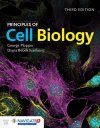Textbook
By: George Plopper(Author), Diana Bebek Ivankovic(Author)
744 pages, colour & b/w photos, colour illustrations
![Principles of Cell Biology Principles of Cell Biology]()
Click to have a closer look
About this book
Contents
Customer reviews
Biography
Related titles
About this book
Principles of Cell Biology, third edition builds a conceptual framework of cell biology using 14, easy-to-understand principles to show how cells function and why we study them.
The text begins with an introduction to the fundamental molecular building blocks of cells: sugars, proteins, nucleic acids, and lipids and then moves on to illustrate how cells use these building blocks to perform their essential functions. With each chapter devoted to a specific principle, students will gain knowledge and understanding that will remain long after the course is complete.
Features of the third edition:
- Every chapter now has a Case Study (often clinically-related) and an Applied Cell Biology box that illustrates technology's impact on the field
- Every chapter has a theme (the Principle) stated up front. This provides context for the subject matter — rather than simply explain what happens in cells — that makes the details fit together
- New callout boxes for finding additional information on the web
- Each new print copy includes Navigate 2 Advantage Access that unlocks a comprehensive and interactive eBook, student practice activities and assessments, a full suite of instructor resources, and learning analytics reporting tools.
Contents
Chapter 1 Life is a Team Sport
Chapter 2 DNA is the Instruction Book for Life
Chapter 3 Proteins are The Engines of Evolution
Chapter 4 Membranes are Complex Fluids that Define Compartments
Chapter 5 The Cytoskeleton Forms the Architectural Foundation for The Structural Complexity of Life
Chapter 6 The Rise of Multicellularity Was a Watershed Moment in Evolution
Chapter 7 The Nucleus is the Brain of a Cell
Chapter 8 RNA Links the Information in DNA to Actions Performed by Proteins
Chapter 9 The Endomembrane System Serves as the Cellular Import/Export Machinery for Most Macromolecules
Chapter 10 Chemical Bonds and Ion Gradients are Cellular Fuel
Chapter 11 Signaling Networks are the Nervous System of a Cell
Chapter 12 Protein Complexes are Cellular Decision-Making Devices
Chapter 13 Progression Through the Cell Cycle is the Most Vulnerable Period in A Cell's Life
Chapter 14 Human Activity Is Triggering a Paradigm Shift in Evolution
Customer Reviews
Biography
George Plopper is a Senior Lead Scientist at the management, information technology, and strategic consulting firm Booz Allen Hamilton in the Washington, D.C. area. He received his Bachelor of Arts degree in Biology from the University of California, San Diego and his PhD in Cell and Developmental Biology from Harvard University in Cambridge, Massachusetts. Prior to joining Booz Allen Hamilton, Dr Plopper was a professor of biological sciences at Rensselaer Polytechnic Institute in Troy, New York. During his 20-year career in academia he received four teaching awards and was named an Education Fellow by the National Academy of Sciences.
Diana Bebek Ivankovic is the Director of the Center for Cancer Research (CCR) and Professor at Anderson University in Anderson, SC. She received an International Baccalaureate degree from the United World College of the Adriatic in Duino, Italy, and a bachelor’s degree in biology from Lander University, Greenwood, SC. She has a master’s degree in zoology and a doctorate degree in microbiology from Clemson University, in Clemson, SC. Dr Ivankovic has taught biology at Clemson University from 1989 to 2004 before coming to Anderson University. She is a cancer survivor, the founder of the Anderson University CCR and has been teaching biology, microbiology, cell biology and genetics since 2004. Dr Ivankovic has received several teaching and leadership awards.
Textbook
By: George Plopper(Author), Diana Bebek Ivankovic(Author)
744 pages, colour & b/w photos, colour illustrations


































